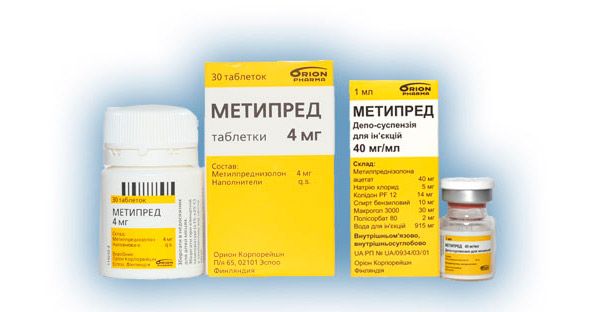Medical expert of the article
New publications
Preparations
Methopred in pregnancy
Last reviewed: 03.07.2025

All iLive content is medically reviewed or fact checked to ensure as much factual accuracy as possible.
We have strict sourcing guidelines and only link to reputable media sites, academic research institutions and, whenever possible, medically peer reviewed studies. Note that the numbers in parentheses ([1], [2], etc.) are clickable links to these studies.
If you feel that any of our content is inaccurate, out-of-date, or otherwise questionable, please select it and press Ctrl + Enter.

Some pregnant women sometimes experience hormonal imbalances for some reason, which leads to the predominance of male hormones over female ones. This can lead to serious problems, including miscarriages. That is why many doctors recommend using Metipred during pregnancy. Its active ingredient is methylprednisolone.
Indications for the use of Metipred during pregnancy
As a rule, during pregnancy, this drug is prescribed when there is a threat of losing the fetus. This is especially important when the patient has had miscarriages before. Among other things, "Metipred" not only helps suppress male hormones in the body of a pregnant woman, but also increases the production of female hormones. It eliminates the main signs of allergies, relieves swelling and inflammation.
Release form
This drug is available in two main forms: tablets (with different dosages of methylprednisolone: 4 mg and 16 mg), and a lyophilisate for creating a solution (a powder that dissolves for injection). In all forms of release, the main active ingredient is methylprednisolone, although for the solution this substance is used in the form of sodium succinate.
 [ 5 ]
[ 5 ]
Pharmacodynamics
It has antiallergic, anti-inflammatory and immunosuppressive effects. When methylprednisolone enters the body, it begins to interact with cytoplasmic receptors and form a complex that induces protein production.
Among other things, the main active ingredient of "Metipred" helps to reduce the amount of such a substance as serum globulin, promotes the synthesis of albumins in hepatocytes, and increases the synthesis of fatty acids. It promotes the redistribution of fat, causing hyperglycemia.
The anti-inflammatory effect of the drug consists in reducing capillary permeability, stabilizing cell membranes and organelles. Cell membranes become less susceptible to damage of various kinds.
Since this drug is immunosuppressive, it inhibits the proliferation of lymphocytes and inhibits the release of cytokines.
Pharmacokinetics
Once the product enters the body, it begins to be absorbed quite quickly, with about 70% of methylprednisolone being excreted. First of all, the substance is metabolized in the liver. When using the powder to create a special injection solution, it is absorbed very quickly and completely. At the same time, its bioavailability is 89%.
When using a solution for making an injection, the maximum concentration of the substance occurs after 1.5 hours. The dose of the drug does not matter, it almost always binds to proteins in plasma by 62%.
The drug is excreted by the kidneys. A day after taking Metipred, 85% of the drug can be found in the urine.
Method of administration and dosage
The dosage of this drug should be determined by a specialist. Metipred is used during pregnancy only under the careful supervision of a professional. As a rule, the average dose is as follows: half a tablet per day (if a woman is only planning to become pregnant). When pregnancy has already occurred, the doctor should individually adjust the method of use. Many women take the drug until the birth itself.

Remember that you cannot stop taking Metipred on your own, as this may lead to a miscarriage.
Metipred in early pregnancy
If this drug is prescribed in the early stages, it strengthens the immunity of the expectant mother, reduces the amount of male hormone and reduces the possibility of miscarriage. But please note that if you have already started taking this drug, you need to do this until the end of pregnancy. Only in very rare cases does the doctor cancel the use of "Metipred".
 [ 8 ]
[ 8 ]
Discontinuation of Metipred during pregnancy
The drug should be discontinued gradually during pregnancy. The course should not be interrupted too abruptly, as this may lead to unpleasant and quite serious side effects. The most well-known of these are: severe muscle pain, fever, adrenal insufficiency (early stage).
Metipred when planning pregnancy
Recently, many women have faced the problem of conception. With such complaints, it is necessary to undergo an examination by an endocrinologist. After passing all the tests, the specialist will be able to see which hormonal drug is needed in a particular case. "Metipred" is especially popular.
For women who are planning to become pregnant, this drug is prescribed:
- If the male hormone testosterone predominates in the female body. This is one of the main reasons for taking "Metipred".
- If there is a threat of miscarriage during pregnancy or they have already happened in the past. This remedy is especially often prescribed to improve hormonal levels immediately after a spontaneous abortion.
- In case of uterine fibroids, the remedy helps to speed up conception.
When planning a pregnancy, many women decide not to take Metipred after a doctor's recommendation. This is fraught with the development of secondary infertility. Also, prednisolone (the main active ingredient of the drug) has an anti-edematous and anti-inflammatory effect, which is very important if you are planning to get pregnant.
Side effects of Metipred during pregnancy
"Metipred" is a serious hormonal drug that can cause serious illnesses, especially if the dosage is prescribed incorrectly. The most common side effects of "Metipred" are:
- Endocrine obesity and moon-shaped face (the so-called Itsenko-Cushing syndrome).
- Suppression of adrenal function.
- Development of diabetes.
- Frequent manifestations of nausea, accompanied by vomiting.
- Development of gastric ulcer.
- Bleeding in the gastrointestinal tract.
- Thrombosis.
- Arrhythmia.
- Headache.
- Depression and hallucinations.
Contraindications for use
The only contraindication to the use of the drug is intolerance to its components. But "Metipred" should be used with special caution:
- For various gastrointestinal diseases (for example, ulcers, gastritis, esophagitis, diverticulitis).
- For patients suffering from parasitic, fungal and infectious diseases (herpes, measles, mycosis, chickenpox, amebiasis, latent tuberculosis).
- Before and after the administration of some vaccines.
- For diseases of the heart and blood vessels (myocardial infarction, arterial hypertension).
- Patients with endocrine diseases (thyrotoxicosis, obesity, hypothyroidism).
- For systemic osteoporosis.
Overdose
Overdosing on the drug during pregnancy can increase serious side effects. To improve the condition, it is usually enough to just temporarily reduce the dosage.
Interactions with other drugs
If "Metipred" is prescribed simultaneously with:
- Phenobarbital, Phenytoin, Ephedrine, Rifampicin may reduce the amount of methylprednisolone in the body.
- Amphotericin B and diuretics often cause increased excretion of potassium from the body, which increases the risk of developing cardiovascular diseases.
- Sodium-based drugs cause increased blood pressure and swelling.
- Anticoagulants (indirect) may lead to an increase or decrease in the effect of these drugs.
- Thrombolytics cause bleeding in the gastrointestinal tract.
- Paracetamol may cause increased hepatotoxicity.
- Vitamin D impairs calcium absorption.
- Androgens and anabolic steroids lead to hirsutism, acne and edema.
- Immunosuppressants increase the risk of developing lymphoma and various infections.
- Antacids reduce the absorption of methylprednisolone.
Storage conditions and shelf life
"Metipred" in tablet form should be stored in a place inaccessible to children. The air temperature cannot exceed +25 degrees. Powder for the preparation of injection solution is stored in an inaccessible place, away from sunlight. The air temperature cannot exceed +25 degrees. If the solution has been reconstituted, it should be stored in the refrigerator (temperature not higher than +8 degrees).
The shelf life of the drug is five years. The reconstituted solution is stored for only one day. Please note that taking Metipred after the expiration date may lead to side effects.
Attention!
To simplify the perception of information, this instruction for use of the drug "Methopred in pregnancy" translated and presented in a special form on the basis of the official instructions for medical use of the drug. Before use read the annotation that came directly to medicines.
Description provided for informational purposes and is not a guide to self-healing. The need for this drug, the purpose of the treatment regimen, methods and dose of the drug is determined solely by the attending physician. Self-medication is dangerous for your health.

